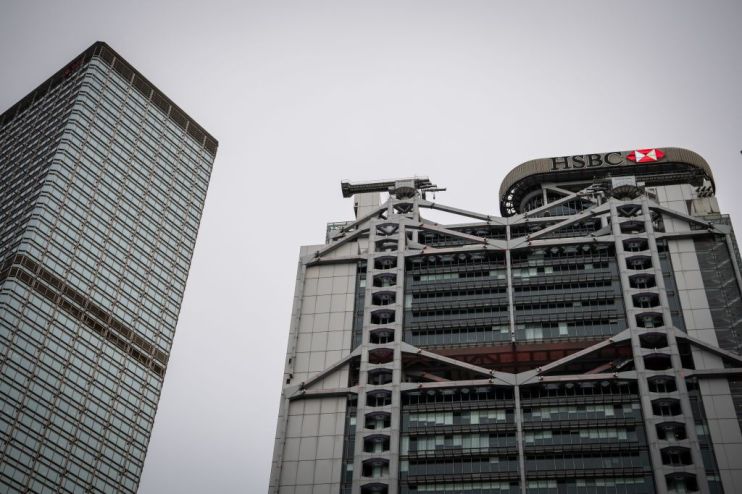Five things you need to know about HSBC’s radical overhaul strategy

Banking giant HSBC today launched one of the most radical strategic overhauls by a blue-chip lender in the past decade in a bid to revitalise its stuttering operations.
HSBC is seeking to slash annual costs by $4.5bn and shed $100bn of assets by 2022 in a bid to keep pace with leaner and more focused competitors.
But how will it make those savings, and what other changes does this substantial shift in strategy actually involve? City A.M. breaks down the key aspects here.
How many jobs will be cut?
HSBC is looking to cut 35,000 jobs by 2022. Although the lender did not announce the figure alongside the details of its strategic overhaul this morning, interim boss Noel Quinn told reporters he expects HSBC’s staff headcount to fall from 235,000 to “closer to 200,000”.
Quinn said the job cuts would be partially managed through natural attrition as opposed to outright job cuts as existing employees leave HSBC, but its investment bank is likely to take a hefty proportion of the cuts.
Chief financial officer Owen Stevenson said the headcount reductions would fall into three different “buckets”, including the downsizing of HSBC’s European and US businesses, as well as a broader cost-cutting plan to cut down on complexity across the group.
HSBC’s move to trim jobs follows several of its European peers. In July, Deutsche Bank confirmed that it plans to cut 18,000 jobs over three years, as part of a turnaround plan by chief executive Christian Sewing.
Societe Generale has slashed 1,600 roles from its securities and trading unit, around eight per cent of the division’s headcount, in a bid to save €500m per year. Last month, it was reported that Royal Bank of Scotland boss Alison Rose is considering axing thousands of jobs at Natwest as part of a series of cost-cutting measures.
How will HSBC restructure its business?
HSBC is cutting the number of regional executive roles from seven to four in a bid to trim costs, and said it would make substantial changes to its overall group structure by merging the “back and middle office” sections of its investment bank and commercial bank.
Its investment banking division is in the spotlight after reporting a nine per cent drop in profit in 2019. The unit has underperformed its commercial and retail counterparts in recent years, accounting for increased costs but a lower share of profit.
HSBC is also planning to shrink its trading and equity research operations in Europe and move its structured products division from London to Asia.
The lender will also combine its retail wealth management and private banking divisions into a single retail banking unit, which will be overseen by former McKinsey consultant Charlie Nunn.
Antonio Simoes, who currently leads HSBC’s private bank, is leaving as a result of the overhaul, making him its highest-profile casualty so far.
HSBC also said it would “reposition” itself in the US, it’s worst-performing region, by slashing its retail branch network by almost a third, reducing operating costs between 10 and 15 per cent, and shifting its fixed-income trading division to London.
Sign up to City A.M.’s Midday Update newsletter, delivered to your inbox every lunchtime
When will HSBC announce a new chief executive?
It’s not yet clear. Despite some investors expecting a new boss to be in place to implement the radical overhaul, HSBC has not yet announced a new permanent chief executive.
HSBC chairman Mark Tucker has previously said the search to replace John Flint, who was ousted last summer, would take six to 12 months.
Noel Quinn, who masterminded the strategy update announced today, has served as an interim chief executive since Flint’s abrupt departure. Quinn has made it known that he wants the top job, and today’s announcement forms part of his audition for the role.
“It seems perverse that the business currently has an interim chief executive in charge, in Noel Quinn, just when it is launching a major restructuring,” said AJ Bell’s Russ Mould.
“The argument appears to be that the board want to get their house in order before appointing a new leader,” he continued. “Whoever is ultimately appointed… will have ideas about the business and where it needs to go and they may not match the current agenda.”
How will the coronavirus outbreak impact the bank?
HSBC, which has substantial operations in Asia, warned this morning that the current coronavirus epidemic was having a significant impact on staff and customers.
“Longer term, it is also possible that we may see revenue reductions from lower lending and transaction volumes, and further credit losses stemming from disruption to customer supply chains,” said Quinn.
The bank has imposed an outright ban on staff travelling to mainland China, the centre of the outbreak, and has extended a ban on staff travelling to Hong Kong, where its Asian operations are based.
What about the dividend?
HSBC announced a dividend per share of 51 cents for 2019, and committed to maintaining its dividend.
However the bank, which has, said it would suspend share buybacks for two years to pay for the massive restructuring efforts.
HSBC said this morning that it expects to incur restructuring costs of around $6bn, the bulk of it in this year and the next.